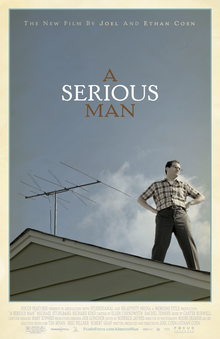This Coen brothers film opens with a prologue set in the 19th century about a Jewish couple in Eastern Europe. It seemingly has nothing to do with the rest of the film. The brothers wanted something that felt like a traditional Yiddish folklore and not knowing of anything suitable, seems to have wrote one themselves. The audience is left confused as to what it means and this may well be the point as the film is about the protagonist experiencing a series of setbacks in his life and being unable to make any sense of it. This film draws heavily from Jewish culture and as such parts of it are inaccessible to me. I enjoyed its bleak humor and admire how this seems to be very much a personal project of the brother, being directly inspired by their own familial backgrounds, but this won’t be one of my favorites.
Larry Gopnik is a married Jewish professor in Minnesota with two kids. His jobless brother Arthur has medical issues and sleeps on the couch in his house. One day his wife Judith approaches him to ask for a ritual divorce so that she can marry widower Sy Ableman. Soon afterwards a South Korean student Clive Park comes to appeal his failing grade and after Larry denies him seems to leave behind an envelop full of cash as a bribe. He himself is facing a vote for approval of tenure and is informed that the committee has received anonymous letters disparaging his moral integrity. The troubles just keep on coming from here: Arthur is warned by the police for gambling, Judith forces him and Arthur to move to a motel, he starts running out of money as Judith drains his bank accounts and he has to pay for a divorce lawyer. He keeps trying to ask for advice from a succession of ever more senior rabbits but they are unable to console him. Meanwhile his children are preoccupied with their own lives and seem unconcerned about the disruption in the household. His son’s Bar Mitzvah is coming soon but Danny is mainly worried about owing money to his marijuana supplier and recovering his radio confiscated by a teacher.
The film ends so abruptly that the audience is left wondering what just happened. This bewilderment and lack of closure or easy answers to the questions in life seems to be the film’s very point. Weird coincidences occur in Larry’s life that defy explanation. A rabbi relates a fantastical story about a Jewish dentist seemingly finding a message in Yiddish on a patient’s teeth yet there is no resolution in the story. The wisest piece of advice is just to see everything with the right perspective. To Arthur, who might also be struggling with repressed homosexuality, despite all of the problems he is currently facing, Larry has it good. I interpret the film’s sudden ending to mean that all of the small problems in life fade to nothing when truly life threatening dangers appear on the horizon. The greatest source of solace for Larry, and unknown to him to his son Danny as well, is simply to chill and relax with a joint of marijuana.
For all that the film is so deeply rooted in Jewish identity, it is surprisingly ambivalent about how much wisdom can be found in Judaism. The rabbis Larry asks for advice aren’t much help. The oldest and wisest of them refuses to see him at all but when he does see his son, he merely ends up dispensing the lyrics of a pop song as life advice. The community praises Sy Ableman as a serious man, which I take it has some specific meaning I am unaware of to Jews, and he take pains to act like a very personable and reasonable man to Larry. Yet he does nasty things to Larry behind his back. In this way, I believe this film honestly captures the brothers’ feelings about their upbringing, how it’s an inextricable part of their identity but that doesn’t mean that they are necessarily very devout Jews. I did enjoy how this is a very specific setting with rambler-style homes to depict the suburban Minnesota of the 1960s. This is a well-crafted film and oozes with authenticity though once again it’s not a film that personally resonates with me.
A critic talked about how this is the kind of personal project you only have the freedom to undertake after you’ve already won an Oscar and that feels about right. The black humor and absurdity here is fun but the milieu and characters are too culturally distant from me to really empathize with. It’s another solid work by the brothers and worth watching but it’s not the kind of film that’s going to make a lasting impression for me.
